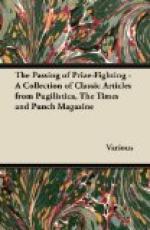THE BARON DE BOOK-WORMS.
* * * * *
SILENT SHAKSPEARE.
DEAR MR. EDITOR,
The great success that has attended the production of L’Enfant Prodigue at the Prince of Wales’s Theatre has encouraged me to make a suggestion in the cause of English Art. Why not SHAKSPEARE in dumb show? The Bard himself introduced it in “The Play Scene.” Allow me to suggest it thus:—
SCENE—A more
remote part of the Platform in Elsinore Castle.
Enter
GHOST; then HAMLET.
Hamlet (in dumb show). “Where wilt thou lead me? Speak!” (In dumb show.) “I’ll go no further.”
Ghost, by kissing his hand towards the horizon, shows that his hour is almost come, when he is bound to render himself to sulphurous and tormenting flames. The latter part of his description is composed of his shrinking about the stage, as if suffering from intense heat.
Hamlet buries his face in his hands, and sobs pitifully, expressing “Alas, poor Ghost!”
Ghost repudiates compassion by turning up his nose, and throwing forward his hands; and then, by pointing from his mouth to his ear, demands HAMLET’S serious attention.
Hamlet touches his own lips, points to GHOST, slaps his heart, and bows, intimating that the GHOST is to “Speak!” and he is “bound to hear.”
Ghost explains that he is his father’s spirit by stroking HAMLET’S face, and then his own, and then shrinks about the stage to weird music, descriptive of his prison-house. He concludes by appealing to HAMLET’S love for him by pressing his clasped hands to his own heart, and then pointing towards the left-hand side of his son.
Hamlet jerks his hands passionately upwards, as if saying, “Oh Heaven!”
Ghost then asks for revenge by touching his dagger, and pointing towards the sky. He acts the murder in the garden, showing the serpent who stung him by gliding about the stage on his chest, like the boneless man. He shows his murderer to be of his own blood by walking up and down as himself, and then in the same way, but with a slight limp, as if he were his brother.
Hamlet might here exhibit “Zadkiel’s Almanack” as “prophetic,” and slap the sole of his shoe for “soul;” for “my Uncle” it would be sufficient to produce a pawnbroker’s ticket:—“Oh my prophetic soul! Mine Uncle!”
Then the Ghost in great detail acts the murder in the orchard, imitating the apples and the singing birds, the setting sun, &c., &c. He shows the composition of the poison after its plucking from a bush, and its arrival in the laboratory. He represents the actual pouring of the poison in his ear. He hints too (by suggesting the action of the bell-ringer) that he was never really mourned, and concludes a most spirited Ballet d’Action by a rapid sketch of the paling of the ineffectual fires of the glow-worm. As he leaves to the music of “Then you’ll Remember Me,” HAMLET imitates cockcrow, which brings the entertainment to an appropriate termination.




